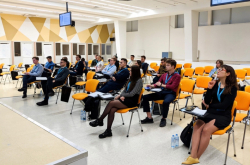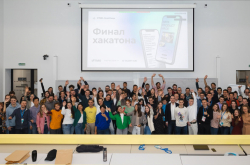This year’s Applied AI Challenge will feature two tracks: FinTech Case, where the participants will have to predict types of economic activity of corporate entities based on their transactional activity, and Oil and Gas Industry Case, where the participants will be predicting oil extraction rates using data from the oil field.
Applied AI Challenge welcomes individual participants regardless of their level of experience in data analysis. To sign up, you will only need to fill in the application form for the track you would like to take part in (FinTech Case or Oil and Gas Industry Case) until May 16, 11:59 pm (GMT+3). On the official website, you will also find the dates for hackathons; they are different for each track. Following the event, 16 best participants in each track will be invited to present their solutions, which will be evaluated by ITMO’s experts and the hackathon’s industrial partners.
The results of the contest will be announced on May 31. Winners will get not only the main bonus of enrolling into ITMO’s Master’s programs without exams, but also perks from the event’s organizers: internships, merch, and books. Another bonus will be the newly introduced scholarships to 6 best performing participants of the event from the Digital Generation student club and the Faculty of Digital Transformation. Upon enrolling into the corresponding programs, these high-achievers will receive a monthly scholarship of 20,000 rubles in their first semester at ITMO.
We asked last year’s winners why it is important to take part in hackathons and in Applied AI Challenge in particular, as well as what projects they are currently engaged in at the university.
Oleg Demin
a student in the Master’s program Big Data Financial Technologies
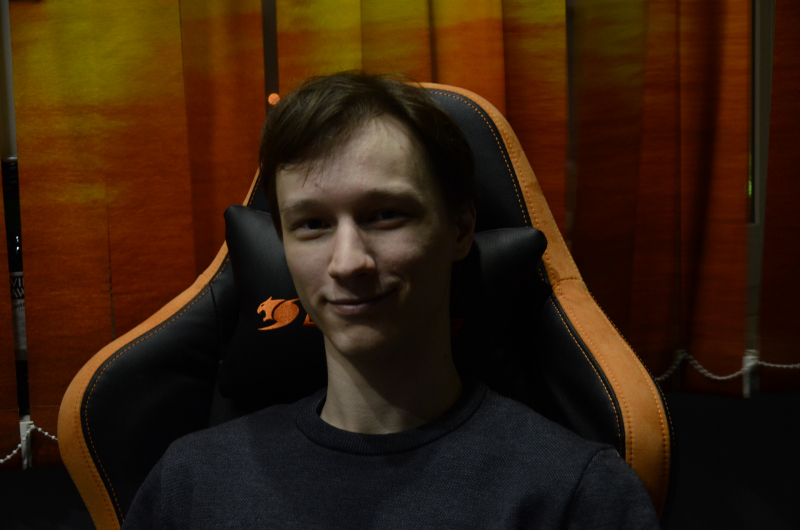
Oleg Demin. Photo courtesy of the subject
Last year, as I was nearing the end of my Bachelor’s degree, I started thinking about where I could go next. I saw several student forums listed at the I am a Professional website and decided to take part in It’s Your Call! organized by ITMO. I really enjoyed the event and decided to apply to ITMO; that’s how I found myself at the hackathon. In my opinion, the fact that you have to solve tasks within a tight time limit makes this an attractive challenge. At the very least, you will get to practice quick decision-making; moreover, there is a chance to win a variety of perks, such as enrollment without exams and merch.
At the hackathon last year, there was an interesting task on AutoML. At the time, I was really into machine learning, so I tried my hand at it – and succeeded. As a result, I enrolled into the Big Data Financial Technologies Master’s program – and I have no regrets because I have found everything I needed: machine learning, finance, big data technologies, and other additional subjects in the field of psychology.
Right now, I am working on improving the methods of identifying a person’s mental state in different conditions, such as various lighting levels, noise pollution, and other unpleasant effects.
Nikita Starodubtsev
a student in the Master’s program Digital Geotechnologies
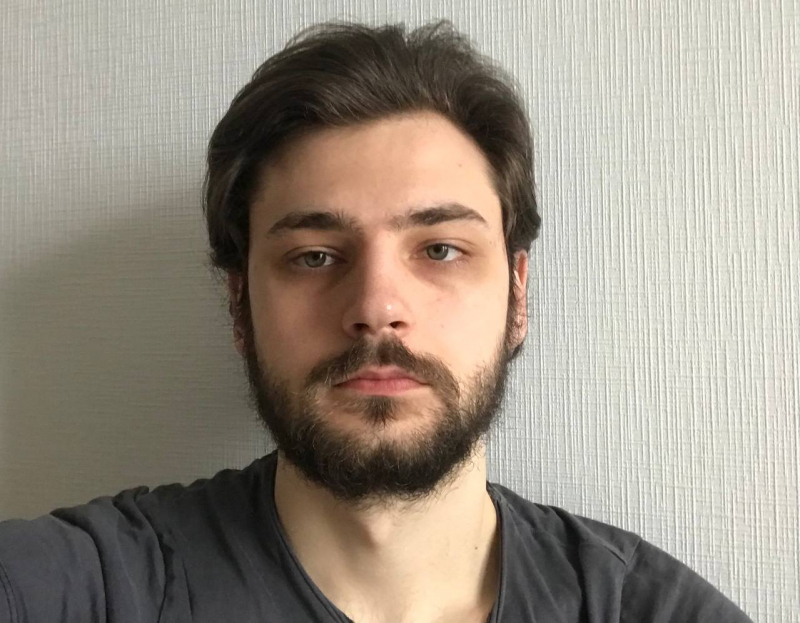
Nikita Starodubtsev. Photo courtesy of the subject
As I see it, such contests have a number of strong sides. First, practical skills are important in almost every field, not only in machine learning, and hackathons are the best way to boost such skills. Second, your wins will look great on your portfolio. This is important because machine learning is growing very rapidly, causing a corresponding increase in the number of requirements for fledgling data scientists: you will often need to have experience of working on a project, even when you are applying as an intern. Third, it’s good practice to analyze the code written by hackathon winners and their solutions. This can be of great help in your own cases in the future.
I think that hackathons without a monetary prize fund (such as Applied AI Challenge) are the most beneficial when you are just starting out: it’s not very likely that one of your opponents will have enormous computational resources that they could use to train very deep neural networks. It’s hard to win against such competition, even if your solution is neat. So, at such hackathons you will have a real chance of placing at the top if you know enough about the subject field. At Applied AI Challenge, the material was very interesting and relevant to machine learning methods.
The most challenging part is always presenting your solution. At the same time, your presentation skills are key in every field anyway, because a great presentation can turn even a bad solution into something worth noticing. That’s why you have to practice giving talks, too, and it’s wonderful that ITMO’s hackathon offers this opportunity.
The best way to prepare, in my opinion, is to analyze information from all available sources. If you are facing a challenge with some task, don’t just give up and forget about it. It is often the case that you can understand it better after you’ve gained some experience. As for particular resources, I would recommend this course in machine learning (in Russian), although it requires some prior training.
After the hackathon, I was able to enroll into the Digital Geotechnologies Master’s program, which I chose because of the research group behind it (from 2022, this group will be curating the Master’s program AI in the Industry – Ed.). It was clear that they were a cool team with interesting projects and active researchers. All of this turned out to be true, so I can say from experience that if you are motivated and ready to put in the hard work, you will be warmly welcomed at the team. You will also have the chance to find work that you will enjoy.
These days, I am doing research in the field of generative design of physical objects. It is a wide and interesting field that includes a wide range of approaches, from optimization methods to machine learning.
Vladimir Panov
a student in the Master’s program Big Data Financial Technologies
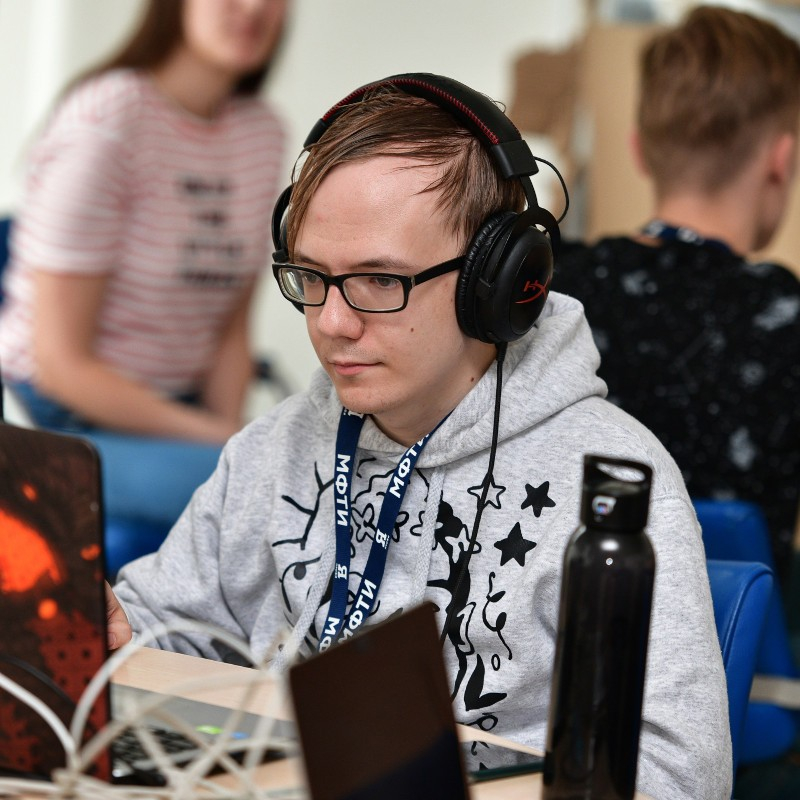
Vladimir Panov. Photo courtesy of the subject
Last spring, I was a final-year Bachelor’s student in Ulyanovsk and became interested in the Applied AI track of the hackathon both because of the task and the opportunity to intern at Tochka Bank. Naturally, the opportunity to enroll without exams didn’t hurt either. At the hackathon, I had the chance to practice fine-tuning neural networks in half-precision and test my hard skills.
Generally, hackathons are great to take part in because it’s where you will usually find original cases you can really dig into; they usually don’t have one perfect solution, which means you have the freedom to experiment. Moreover, you can acquire or polish your skills with machine learning, deep learning, or other approaches. Finally, you can train your intuition for such tasks so that you are able to see which method suits each problem best. You can also include your hackathon experience in your CV, and if you win you can apply for various scholarships.
I believe that the best way to prepare to Applied AI Challenge is to practice by taking part in other hackathons, such as Kaggle or ODS, or even the Artificial Intelligence track of the I am a Professional contest. I would also recommend courses on neural networks and computer vision on Stepik and Deep Learning School. Additionally, you can join the ods.ai community – they have many useful resources and links.
As a result, I got into the Big Data Financial Technologies program, which attracted me with its combination of specializations. Moreover, I really liked that I could enroll through a hackathon. I am currently working on analyzing texts from social media at one of the labs of the AI Research Center “Strong AI in Industry”. My current task is to anonymize these texts so that their original authors cannot be identified, while still keeping the remaining text useful for sentiment analysis and event detection.
Roman Gorifyanov
a student in the Master’s program Big Data Financial Technologies

Roman Gorifyanov. Photo courtesy of the subject
Last year, I was doing research in the field of physics (modeling and apodization of Bragg grating), but I forced myself to get into machine learning from scratch. I was able to do it thanks to MOOCs.
For me, the hackathon was first of all a chance to get into a Master’s program without exams. However, it was also an opportunity to try my hand at real-world cases. The most challenging task for me was to develop a truly complex and high-quality model and introduce new features into it.
After the hackathon, I was able to enroll into the program Big Data Financial Technologies. I always liked finance; in school I took part in math and economics contests, and as a student I learned a lot about investing and blockchain solutions for centralized systems. I am currently studying P2P loan systems, especially in Russia; I am curious to learn why such products aren’t popular here. Maybe with the introduction of a digital currency or a decentralized state system it will be possible to introduce this useful and socially important tool.
Article by editorial team and the Faculty of Digital Transformation


